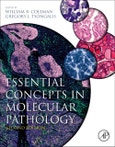Essential Concepts in Molecular Pathology, Second Edition, offers an introduction to molecular genetics and the "molecular" aspects of human disease. The book illustrates how pathologists harness their understanding of these entities to develop new diagnostics and treatments for various human diseases. This new edition offers pathology, genetics residents, and molecular pathology fellows an advanced understanding of the molecular mechanisms of disease that goes beyond what they learned in medical and graduate school.
By bridging molecular concepts of pathogenesis to the clinical expression of disease in cell, tissue and organ, this fully updated, introductory reference provides the background necessary for an understanding of today's advances in pathology and medicine.
Please Note: This is an On Demand product, delivery may take up to 11 working days after payment has been received.
Table of Contents
PART I Essential Pathology Mechanisms of Disease 1. Molecular Mechanisms of Cell Death 2. Acute and Chronic Inflammation 3. Infection and Host Response 4. Neoplasia
PART II Concepts in Molecular Biology and Genetics 5. Basic Concepts in Human Molecular Genetics 6. The Human Genome: Implications for the Understanding of Human Disease 7. The Human Transcriptome: Implications for the Understanding of Human Disease 8. The Human Epigenome: Implications for the Understanding of Human Disease 9. Clinical Proteomics and Molecular Pathology 10. Integrative Systems Biology: Implications for the Understanding of Human Disease 11. Pathology: The Clinical Description of Human Disease 12. Molecular Pathogenesis: The Biological Basis of Human Disease and Implications for Improved Treatment of Human Disease 13. Integration of Molecular and Cellular Pathogenesis
PART IV Molecular Pathology of Human Disease 14. Molecular Basis of Cardiovascular Disease 15. Molecular Basis of Hemostatic and Thrombotic Diseases 16. Molecular Basis of Lymphoid and Myeloid Diseases 17. Molecular Basis of Diseases of Immunity 18. Molecular Basis of Pulmonary Disease 19. Molecular Basis of Diseases of the Gastrointestinal Tract 20. Molecular Basis of Liver Disease 21. Molecular Basis of Diseases of the Exocrine Pancreas 22. Molecular Basis of Diseases of the Endocrine System 23. Molecular Basis of Gynecologic Diseases 24. Molecular Pathogenesis of Kidney Diseases 25. Molecular Pathogenesis of Prostate Cancer: Somatic, Epigenetic, and Genetic Alterations 26. Molecular Biology of Breast Cancer 27. Molecular Basis of Skin Disease 28. Molecular Pathology: Neuropathology
PART V Practice of Molecular Medicine 29. Molecular Diagnosis of Human Disease 30. Molecular Assessment of Human Disease in the Clinical Laboratory 31. Pharmacogenomics and Personalized Medicine in the Treatment of Human Disease








